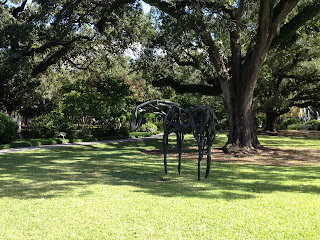The Invisible Stalker
As my teacher, Takeguchi Sensei always says: Try to be able to practice with everybody. In the spirit of his teaching, we also try to help everybody, regardless of age, color, sex and gender, to learn so that they can become the best version of themselves.
Our oldest dojo member, Stephan, is in his late 60s. After a very long hiatus, he decided to rekindle his love for Aikido. His presence is delightful, and his enthusiasm is contagious. We like having him in class.
It has been decades since Stephan took Aikido with his son. His body does not fail to remind him of the mileage that he has accumulated by communicating through his stiff back and achy joints. Stephan already has a knee surgery. Another one is scheduled for later this year. Mobility has been a real issue for him.
"I have always dreamed of getting a black belt in Aikido some day. But, at this point, given my age and my physical condition, I really do not think it is going to happen," Stephan lamented, as if he had given up on his dream.
Stephan is not alone. Guess what? We all age. Take myself as an example: Even though I am technically more proficient than before, there are things that I could do twenty years ago, but I cannot do them anymore. With time, I am certain that more things will be outside of my physical capabilities. Does it mean I should resign from the idea of improving myself?
In my tap dancing class, the regulars are a bunch of middle age women like myself. (Or, as our teacher says: we are beyond the age of doing splits . . . 😅 ) Instead of pushing us on power moves like he would with teenagers, Mr Baakari likes to hone our skills on control. "Not that I cannot teach you to dance the other way, but that is not how you should be dancing at this point of your life," he explained.
While it can be challenging to be fast, it is actually not easy to be slow. We once performed a piece with very slow but graceful moves that makes so little sound. Mr Baakari even said, "You almost have to listen for it!" Many in the audience came to our group afterwards to praise us on the performance of such an intimate dance.
By the same token, for Stephan to improve his aikido, he should not be comparing himself to the students who are in their 20s or 30s, and, thus, try to do fast, strong movements or huge, jumping break falls. Everything has its time. If Stephan is ever to get a black belt, it will not be about how powerful his techniques are or how hard he can throw. It will be more a matter of whether he manages to tame his heart and exercise self control.
As he once admitted, Stephan has quite a strong ego, and his default mode, when something comes up, is to feel angry. He used to fight people in his younger days and he can be quite aggressive. Sometimes the strongest enemy is not in the outside, but is from within. This enemy has been stalking him all his life. To wear a black belt, even if Stephan cannot shake the enemy off, he has to demonstrate that he can keep it under control. To me, that is probably much harder than doing a randori (multi-attacker free style) with four attackers.
Here is a quote from my beloved teacher, Kenneth Cottier Sensei for Stephan and others who can use it: "Do not worry about whether you will get a black belt. You will, as long as you keep practicing."



Comments
Post a Comment